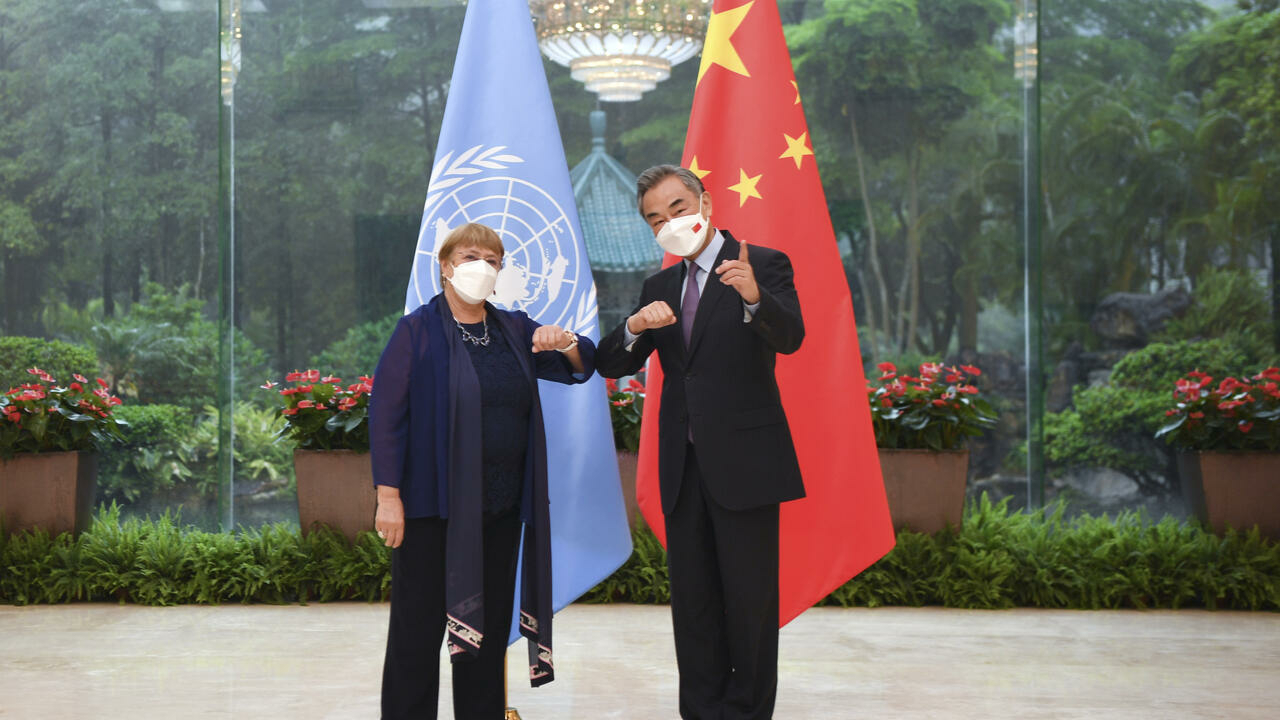
In this photo released by Xinhua News Agency, Chinese Foreign Minister Wang Yi, right, meets with the United Nations High Commissioner for Human Rights Michelle Bachelet in Guangzhou, southern China’s Guangdong Province on Monday, May 23, 2022.
China faced new accusations Tuesday that it was sanctioning abuses of Uyghurs at the “highest levels”, as a vast document leak came out during a controversial visit by the UN rights chief.
Advertising Read more
The ruling Communist Party is accused of detaining over one million Uyghurs and other Muslim minorities in the far-western region of Xinjiang as part of a years-long crackdown the United States and lawmakers in other Western countries have labelled a “genocide”.
China vehemently denies the allegations, calling them the “lie of the century”.
Michelle Bachelet is expected to visit the Xinjiang cities of Urumqi and Kashgar on Tuesday and Wednesday as part of a six-day tour.
She met Foreign Minister Wang Yi who “expressed the hope that this trip would help enhance understanding”, according to a readout of the meeting released late Monday.
In its report of the meeting, state news agency Xinhua said Bachelet “congratulated China on its important achievements in economic and social development and in promoting the protection of human rights”.
Bachelet’s spokesperson did not confirm to AFP what was said outside the opening comments.
The United States reiterated its view that Bachelet’s visit was a mistake after the release of thousands of leaked documents and photographs from inside the system of mass incarceration.
Reported by a consortium of media, including the BBC and Le Monde, the Xinjiang Police Files showed top leaders in Beijing including President Xi Jinping calling for a forceful crackdown.
The files, leaked by an anonymous source to academic Adrian Zenz, also included a 2017 internal speech by Chen Quanguo, a former Communist Party secretary in Xinjiang, in which he allegedly orders guards to shoot to kill anyone who tries to escape.
State Department spokesman Ned Price said the United States was “appalled” by the latest allegations.
“It would be very difficult to imagine that a systemic effort to suppress, to detain, to conduct a campaign of genocide and crimes against humanity would not have the blessing — would not have the approval — of the highest levels of the PRC government,” Price told reporters, referring to the People’s Republic of China.
Pressure on Bachelet
The US ambassador to the United Nations, Linda Thomas-Greenfield, said the evidence showed that Bachelet “must take a hard look at these faces and press Chinese officials for full, unfettered access — and answers”.
Britain and Germany also voiced outrage.
In a call to her counterpart, German Foreign Minister Annalena Baerbock called for a “transparent investigation” into the “shocking reports and new evidence of very serious human rights violations in Xinjiang”, said a German foreign ministry statement.
Foreign ministry spokesman Wang Wenbin called the report “the latest example of anti-China forces smearing Xinjiang”.
Earlier this month, a leaked police database obtained by AFP listed the names and details of thousands of detained Uyghurs.
Uyghurs have raised doubts about Bachelet’s presence if the trip is as highly controlled as expected.
Nursimangul Abdureshid, a Uyghur living in Turkey, said she was “not very hopeful that her trip can bring any change”.
“I request them to visit victims like my family members, not the pre-prepared scenes by the Chinese government,” she told AFP.
Another Uyghur, Jevlan Shirememet, called on Bachelet to help him contact his mother, whom he has not seen for four years.
The Turkey-based 31-year-old — from the province’s northern reaches near the border with Kazakhstan — also said he hoped Bachelet would venture further than her itinerary.
“I don’t know why she can’t visit these places,” he told AFP.
Promises on access
Regional capital Urumqi is home to many of the government agencies believed to be behind the campaign China has described as a crackdown on religious extremism.
The city of four million has a sizeable Uyghur community and was the site of deadly ethnic clashes in 2009 as well as two attacks in 2014.
Kashgar — home to 700,000 people — lies in the Uyghur heartland of southern Xinjiang.
An ancient Silk Road city, it has been a major target of Beijing’s crackdown, researchers and activists say, with authorities accused of smothering the cultural hub in a high-tech security blanket while bulldozing Uyghur homes and religious sites.
Bachelet on Monday gave assurances about her access to detention centres and rights defenders during a virtual meeting with the heads of dozens of diplomatic missions in China, according to diplomatic sources.
Caroline Wilson, the UK’s ambassador to China, was on the call and tweeted that she stressed “the importance of unfettered access to Xinjiang and private conversations with its people”.
(AFP)
Daily newsletterReceive essential international news every morning Subscribe







